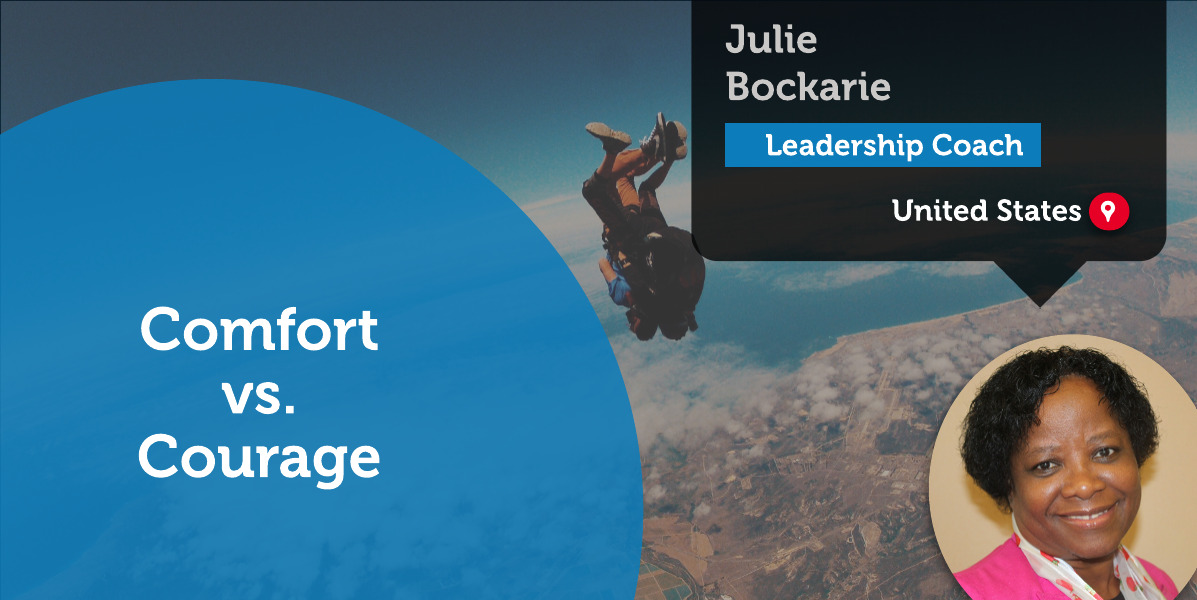A Coaching Power Tool By Julie I Bockarie, Leadership Coach, UNITED STATES
Many people, especially women leaders encounter barriers in their careers, which make it difficult for them to advance to higher positions. These barriers morph into inner glass ceilings which show up as self-limiting beliefs, fear, feeling of inadequacy, among others, that keep them stuck in their comfort zones. These comfort zones are truly uncomfortable zones masked by their stories.
Coaching is a powerful tool that can unmask their stories and reveal the courage within, which in turn can help them overcome both the external and internal barriers, setting them free to pursue the life they desire.
Comfort Zones
Being in a place of comfort can lead to complacency, which leads to paralysis. I can speak confidently about this, as one who has experienced it. The “it” is the dream of becoming what one desires, but never quite reaching whatever that something is. Sometimes, it takes only a little trigger to get them stuck, or worse, to get them to quit on their dreams. It could be a question by a significant other that plants doubt in their minds. Unfortunately, this small question can lead to deep-seated paralysis which is hard for them to dig themselves out of.
In other cases, it could be the way they were raised or something that they were made to believe sometime in their lives, which have them moving in circles and holding onto stories that are not serving them. Women by nature are courageous when it comes to protecting their loved ones, or even helping others. When it comes to their own affairs, however, some are usually not as courageous. They are quick to give up on their dreams and believe that they are not capable.
Challenging the Comfort Zone
When a client comes in with a story that reveals a perception that might be getting in the way of their progress, the coach would need to dig deeper to find out what is going on deep down and get the client to zero in on what their true goal is, and what is preventing them from reaching it. The coach may recognize that there is a limiting belief that keeps them stuck, without getting into the stories nor their past. To help the client move forward towards their goal, the coach would need to help the client become aware of what they may not be able to see on their own. This creates awareness. With the awareness, the client could see what has them stuck, and support them to find a way to move forward.
This may be in the form of powerful questions which challenge their current mindset, like Byron Katie’s four questions:
- “Question 1: Is it true? This question can change your life. …
- Question 2: Can you absolutely know it’s true? …
- Question 3: How do you react—what happens—when you believe that thought? …
- Question 4: Who would you be without the thought? …
- Turn the thought around: …”
Questions like these would have our clients examine their stories, and know if they are true, and if they are allowing themselves to be their genuine selves. Examining these stories might them drive the client to discover their authentic self. This requires courage.
Another way of challenging our client’s comfort zone might be through observation and mirroring what the client is telling you. “You say this, but that seems to conflict with the goal you told me you want to achieve, what comes to mind when I say that?” Observation and mirroring sometimes lead to an “aha moment” for our clients. Sometimes, it might feel like scales falling off one’s eyes. This place of awareness can then invite questions like,
- What are you realizing or learning?
- How can the awareness share help you towards reaching your desired goal?
Courage Zone
The questions above will then lead them to what I call the “courage zone” which requires taking uncomfortable steps. The idea is not to push a solution on the client, even if we are convinced as to what steps they need to take. They are the ones to discover the solution and hence drive the action. We should also not push an action too fast in order not to discourage our client. Sample questions to get a client into the courage zone might be the following:
- What is a small step you can take immediately to help you reach your goal?
- When do you plan to take this step?
- What could help ensure that you take this step?
- What could get in the way?
Once they are in this zone, they usually begin to get excited about the way forward. The coach can then question them regarding how to mitigate what could get in the way, and how they can use lessons learned from the session in the future.
The process of helping a client change a perspective that might not be serving them requires the coach to be fully present, and pay attention to verbal and non-verbal cues. It also requires the use of tools that challenges the client’s mindset. This is particularly important for women who are used to fighting battles for others, but often not for themselves. Coaching empowers them and becomes the tool with which they can fight for themselves.
References
Katie, Byron. The Age of Ideas: Byron Katie’s Four Questions. https://theageofideas.com/byron-katies-four-questions/
